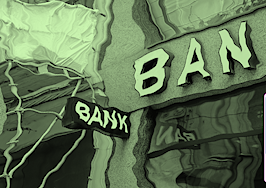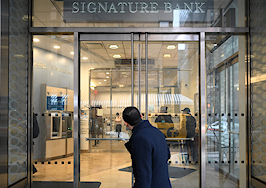In these times, double down — on your skills, on your knowledge, on you. Join us Aug. 8-10 at Inman Connect Las Vegas to lean into the shift and learn from the best. Get your ticket now for the best price.
Mortgage rates were headed sharply lower Monday as financial markets reacted to the failure of Silicon Valley Bank (SVB), with forecasters predicting that the Federal Reserve will ease up on rate hikes aimed at curbing inflation.
In an ironic twist, mortgage rates are nosediving because investors seeking a safe place to park their money in the wake of SVB’s failure are piling into the same investments that got the bank into trouble — long-term Treasurys and mortgage-backed securities (MBS).
Yields on 10-year Treasurys, a useful indicator of where mortgage rates are headed, plummeted Friday and Monday hitting levels not seen since January. When demand for bonds is high, their value goes up, pushing down yields.
10-year Treasury yields fall to January levels

Yields on 10-year Treasury notes plummeted in the wake of Silicon Valley Bank’s failure. | Source: Yahoo Finance
Yields on 10-year T-notes, which were above 4 percent on Thursday, dipped as low as 3.42 percent Monday before recovering some ground as investors were reassured by the government’s move to contain the fallout from the failures of Santa Clara, California-based SVB and Signature Bank of New York.
In the hopes of preventing runs at other banks, federal regulators on Sunday announced a “systemic risk exception” that will “fully protect” all depositors at SVB and Signature Bank — including those with more than the $250,000 maximum insured by the Federal Deposit Insurance Corp (FDIC).
President Joe Biden nevertheless promised Monday that “No losses will be borne by the taxpayers. Instead, the money will come from the fees that banks pay into the Deposit Insurance Fund.”
Mortgage rates, which had looked headed back above 7 percent last week after Fed Chair Jerome Powell delivered a pessimistic inflation report to Congress, have also eased since the SVB crisis built steam Thursday.
Daily loan lock data tracked by Optimal Blue shows rates on 30-year fixed-rate conforming mortgages fell Thursday and Friday, retreating from a 2023 high of 6.84 percent registered Wednesday, March 8.
According to an index compiled by Mortgage News Daily, rates on 30-year fixed-rate mortgages averaged 6.57 percent Monday, down nearly half a percentage point from 7.05 percent on March 9.
After Powell’s testimony last week, futures markets were pricing in a 78 percent chance Fed policymakers would accelerate their rate-hike campaign and bump the federal funds rate up by 50 basis points at their next meeting which concludes on March 22.
But the failures of SVB and Signature Bank — coupled with a slowdown in wage growth revealed in a jobs report Friday — have forecasters and financial markets thinking the Fed will take a more relaxed approach next week.
Economists at Bank of America said Monday that they still expect the Fed to approve a 25-basis point increase in March, but their counterparts at Goldman Sachs think the Fed will pause altogether.
Futures markets tracked by the CME FedWatch Tool predict there’s only about a one in three chance that the Fed will leave rates where they are next week and a 69 percent chance of a 25-basis point hike. But a 50-basis point increase now looks off the table.
Looking ahead, Goldman Sachs economists led by Jan Hatzius still envision 25-basis point rate hikes in May, June and July. That would bring the federal funds rate to a target range of 5.25 percent to 5.5 percent, up from 4.5 to 4.75 percent today.
Futures markets are betting that the Fed will reverse course and start lowering rates this year to stave off a recession as the economy cools — a view already held by some mortgage rate forecasters before SVB’s failure.
Recession could set stage for mortgage rates to ease

Projected rates for 30-year fixed-rate mortgages | Source: February forecasts by Fannie Mae and the Mortgage Bankers Association
Pacaso co-founder and venture capital investor Spencer Rascoff tweeted Monday that 40 percent of his portfolio companies — about 100 startups — had money with SVB that most have moved to JP Morgan or First Republic Bank.
Shares in First Republic and a number of other regional banks including Western Alliance, PacWest Bancorp, Customers Bancorp and Comerica initially posted double-digit declines Monday on fears they, too, could be vulnerable to a run on deposits.
But shares in big mortgage lenders, including Rocket Cos., United Wholesale Mortgage, loanDepot and Guild posted gains as investors took a positive view of their ability to weather the storm.
Rascoff tweeted that SVB “was by far the biggest provider of venture debt to startups and that product is dead for a while,” he also called the prospect of a slowdown in Fed rate hikes a potential silver lining.
“For now, the world will not end,” Rascoff concluded a 23-part Twitter thread. “Grateful to the govt for doing the right thing to avoid catastrophe. We came very close to the precipice.”
But others pointed to the Fed as the root of the crisis — first, for bringing interest rates to record lows during the pandemic to prevent the economy from imploding and then ratcheting them back up at breakneck speed to combat inflation.
Writing for The Guardian, Nobel prize-winning economist Joseph Stiglitz called the crisis predictable, “Given the large and rapid increases in interest rates [Fed Chair Jerome] Powell engineered.”
“Market volatility is normal,” Barry Ritholtz, of Ritholtz Wealth Management LLC, wrote Friday. “After a 40-year bull market in bonds led by rates falling to zero, some disruptions are to be expected. But it is becoming increasingly obvious that the unprecedented sell off in bonds has been caused less by actual rates — they are historically rather modest — than by the speed at which the Fed has cranked them up.”
Flush with deposits, SVB and other banks invested billions in Treasurys and mortgage-backed securities backed by Fannie Mae and Freddie Mac. Although those investments pose little risk of default, they can lose value in a rising interest rate environment.
Accounting rules allow banks to ignore paper losses on some securities if they intend to hold them to maturity. But SVB faced a cash crunch when depositors became aware of those paper losses and rushed to take their money out.
In total, banks had $620 billion in unrealized losses on such securities at the end of last year, The Wall Street Journal reports, citing FDIC data.
Some Democrats are blaming a 2018 law that loosened supervision of banks with assets of less than $250 billion for the failures of SVB and Signature.
“Had Congress and the Federal Reserve not rolled back the stricter oversight, SVB and Signature would have been subject to stronger liquidity and capital requirements to withstand financial shocks,” Sen. Elizabeth Warren (D-MA) said Monday. “They would have been required to conduct regular stress tests to expose their vulnerabilities and shore up their businesses. But because those requirements were repealed, when an old-fashioned bank run hit SVB, the bank couldn’t withstand the pressure — and Signature’s collapse was close behind.”
Get Inman’s Extra Credit Newsletter delivered right to your inbox. A weekly roundup of all the biggest news in the world of mortgages and closings delivered every Wednesday. Click here to subscribe.













